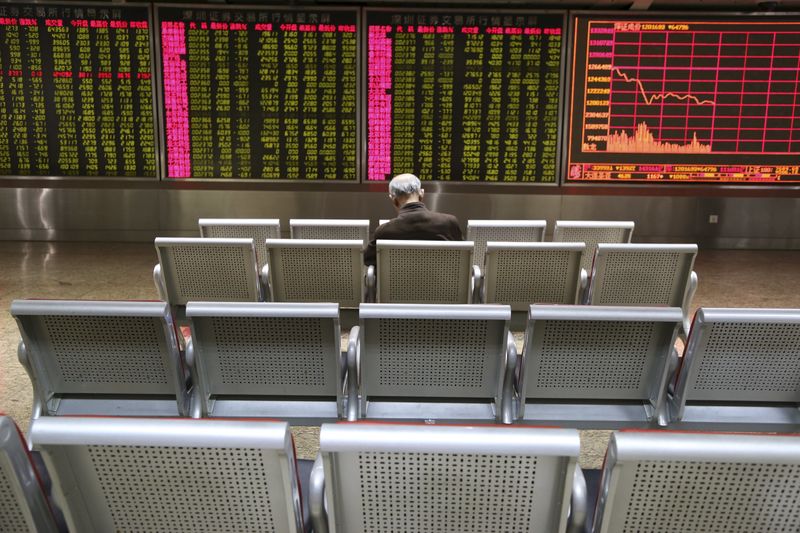By Pete Sweeney and Samuel Shen
SHANGHAI (Reuters) - China's major stock exchanges tanked on the first trading day of the year, triggering a "circuit-breaker" that suspended equities trade nation-wide for the first time and putting at risk months of regulatory work to restore market stability.
The selloff saw the CSI300 index <.CSI300> of the largest listed companies in Shanghai and Shenzhen lose 7.0 percent before trading was suspended, its worst single-day performance since late August 2015, the depth of a summer stock market rout.
U.S.-listed shares of Chinese companies followed suit, with marquis names such as Alibaba Group Holdings Ltd (N:BABA) and Baidu Inc. (O:BIDU) dropping by more than 4 percent each in premarket trading. The iShares China Large-Cap ETF (P:FXI) was off 3.3 percent and ranked among the most actively traded before U.S. trading began.
The collapse, which followed the release of weak economic data on Monday, raises fresh doubts about regulators' capacity to wind back heavy trading restrictions implemented in the wake of a massive summer stock market crash in which major indexes lost as much as 40 percent before top leadership intervened.
In fact, many analysts attributed the decline to the imminent end of a 6-month lockup period on share sales by major institutional investors, a policy implemented to shore up indexes in the wake of the crash.
"This is quite unexpected," said Gu Yongtao, strategist at Cinda Securities.
"The slump apparently triggered intensified selling, while the trigger of the circuit breaker seems to have heightened panic, as liquidity was suddenly gone and this is something no one has experienced before. It was a stampede."
Haitong Securities analysts had earlier estimated that up to 1.24 trillion yuan worth of shares would be freed up for sale by next Monday, assuming the lockup period is not extended.
The collapse in Chinese shares sent ripples across global financial markets, causing other stock markets to reel and stoking demand for safe-haven assets such as government bonds. [MKTS/GLOB] U.S. equity index futures were between 1.8 percent and 2.2 percent lower, suggesting a sharp drop at the market open. (N)
CONFIDENCE DASHED
China's response to the summer market crash was seen by many inside the industry as heavy-handed, as it included suppression of futures and derivatives markets and instilled an atmosphere of fear at brokerages as regulators pulled in executives for questioning about insider trading and "malicious short-selling."
While that stabilised indexes, it also suppressed volumes and poured cold water on foreign investors, who began moving out of Chinese shares.
However, authorities recently showed signs they believed indexes had stabilised, in particular by allowing initial public offerings (IPOs) to resume in November, a vote of confidence given it was a flood of IPOs that was blamed for setting off the crash in the first place.
The circuit breaker mechanism, which halts trade for 15 minutes if the CSI300 index falls or rises 5 percent in a day, then suspends trade for the day if it continues to fall or rise to 7 percent, is a new measure that came into effect Monday and was put to test immediately.
Chinese individual shares had already been subject to a 10 percent intraday trading range.
However, Monday's performance caused some analysts to doubt the efficacy of the new measure.
"Without the circuit breaker mechanism, the market wouldn't have dropped so much," said David Dai, Shanghai-based investor director at Nanhai Fund Management Co.
"The mechanism deepened investor panic, and limited trading."
Dai added that the circuit breaker would actually embolden market bears, as they don't have to worry about a late-session rebound.
"This mechanism should be scrapped, or at least modified."
Market reforms put on hold by the crash could be delayed further if the circuit breaker fails to halt selling pressure and markets - which had recovered more than 25 percent from the pit of the crash prior to Monday's correction - head lower again.
A selloff could pressure stock regulators to re-freeze IPOs to preserve liquidity, to extend the share lockup to prevent more selling, and keep the "national team" of brokerages and fund management firms on the hook to keep buying and holding stocks at a loss.
It could also further dent confidence in the China Securities Regulatory Commission (CSRC) and of the wider financial regulatory framework to manage increasingly complex markets even as China's economy struggles against major headwinds.

Another retreat would likely bolster the case for the creation of a "super regulator" that would step to manage the CSRC and other related regulators to improve coordination.